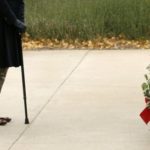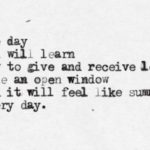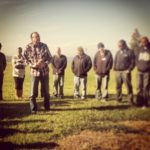‘Re-Thinking the Margins and Center’ by @ChrisHeuertz at Lausanne’s North American Younger Leader Gathering 2012
[*NOTE :: The beginning of the audio picks up in the 2nd paragraph of this manuscript]
A. Intro :: Establishing Context
I grew up in Omaha, Nebraska, the oldest of 6 children. Because my parents hadn’t graduated college they worked low paying jobs and dreamed of better opportunities for their own kids. So they put us in private schools they couldn’t afford. By the time I was a junior in high school my parents were working 7 jobs between the two of them. It wasn’t easy but we always had grilled cheese or fish sticks or something hot on the table. They weren’t the hippest or the newest, but my brothers, sisters and I always had shoes on our feet. And we had access to good education.
Fast forward to my junior year of university. I was studying in Jerusalem at an institute on Mt. Zion. Between and after classes I would go down the Hinnom Valley and kick a soccer ball around with internally displaced Palestinian children.
The Palestinian kids I met had one thing in common with my own childhood—their parents also worked 6-7 days a week 14+ hours a day. But these kids didn’t always have hot meals, many of them were barefoot and few of them were in school.
One evening after kicking the ball around I went back to my dorm room and popped open the Scripture. Suddenly all those passages about the poor and the oppressed jumped out at me as if I had never seen them before.
Of course I had.
I compare it to living in Wilmore, Kentucky, a small country town where I stayed for several years. One summer evening I met Phil and Marsha, a nice couple hoping to become missionaries in Malaysia. Phil and Marsha had also been living in Wilmore for several years, but somehow we had managed to miss each other—surprising since there were only 4,200 people in the whole zip code and we also happened to go to the same church.
I assumed I had never seen them before. However, that following week I bumped into Phil & Marsha everywhere. At the local market. On main street. And later that Sunday at church. It was as if I couldn’t get away from them even if I wanted to.
Much like that sunny afternoon in Jerusalem I was introduced to a reality that I had overlooked, something that I glanced at without recognizing. And much like putting a name to a face in a small Kentucky town, those Palestinian children put faces to stacks of Scripture I had spiritualized in order to apply to my own reality. Suddenly it felt as if I were reading a whole new Bible, passage after passage jumped out at me.
This is an observation, not a judgment, but most North Americans who gather at events like this don’t actually have friends who are poor, we don’t know poor folks. Sure, we may have met many people in poverty on missional excursion trips, or perhaps those that our vocations compel us to serve, but truth be told how many friends who are poor routinely join you at your table for a meal?
Apart from authentic relationships and friendships our assumptions may be painfully distant from the reality of those suffering in poverty. (1)
Our challenge is connect our notions of poverty with the reality of those who live in contexts of poverty.
But how? What is poverty and who are “the poor?” Why are people poor? How do we respond?
B. What :: What is Poverty?
I want to suggest 3 basic ways of understanding poverty (2). Of course, in reality it is much more complicated than these 3 quick handles, but I think most of us operate from different starting points which convolute subsequent conversations towards social engagement. Finding common ground and establishing basic agreements in our starting points helps us find clearer ways forward.
1) First, poverty can be understood as the shared condition of humanity, that apart from God’s love and the grace of the Divine we are morally and spiritually bankrupt.
2) Second, not to diminish those who suffer the consequences of bad or short-sighted decisions, but poverty is also the imposition of oppression. A lack of freedom. Inability to access opportunity or resources.
3) Third, embodied in the life of Christ and illuminated in 2 Corinthians 8:9, poverty is a cultural celebration of the Kingdom of God, “Though he was rich, Jesus became poor so that through his poverty we might become rich.”
C. Who :: Who are “the Poor?”
When we begin to understand what the problem is, we then have eyes to see those impacted by unjust realities.
So who are “the poor?” My sense is that we ascribe labels of poverty based on our own false centers, for example:
1) There are no voiceless people, only those we do not listen to.
2) Terms like beggar, prostitute, leper over identify a person with how they suffer, diminishing their humanity and ours in the ascribing of the labels (3).
3) Even using the term “the poor” creates distance, further separating our realities and pushing people further to the margins of our false centers.
D. Why :: Why are People Poor?
We cannot dream of unpacking the multi-layered causes of poverty, but in a context such as this I will at least suggest that our theology is one compounding factors that aggravates poverty. Let’s evaluate Luke 4 to understand this:
1) In Luke 4 Christ begins his public ministry by announcing that the Good News is for those who are poor. In Luke 4:22 the men in the synagogue, ethnically repressed and politically suppressed Jews in a Roman empire, find this thrilling and graciously receive the message.
2) Jesus, realizing they’ve actually missed the point continues. He re-narrates the story of a widow in Zarepath who shares her food with Elijah, saving the prophet and ultimately saving the house of Israel.
3) After hearing the retelling of this ancient story the men are furious and in Luke 4:28 (just 6 verses after their praise of Christ’s words) are now so upset they want to throw Jesus off a cliff? Why? What did he do to enrage them?
4) In the re-telling of this story Christ uncovers that the Good News for the poor isn’t for the men in the synagogue, but for those made poor, those pushed to the margins by the malformed theology of the religious (4). Ultimately the person who saved the prophet saved the Jews, but who was this person:
a. A woman. How could a woman save men?
b. A foreigner, the so-called ethnic other.
c. A pagan, she wasn’t even Jewish.
d. As a widow, a single parent, socially marginalized.
e. And poor, economically at the end of her resources.
5) Her gender, race, religious, social and economic status were all pushed to the margins by a misunderstanding, a malformed and violent theology aimed against the vulnerability of another’s human dignity.
6) In 2012 we are guilty of committing this type of violence against to the so-called other. Women, non-Western, non-white, non-normative sexual orientations, ecumenical (5) or non-Christian faith traditions (6), those in poverty are all pushed to the margins of our realities and often reduced to so-called target audiences or potential converts.
E. How :: Dismantle False Centers and Re-think Margins
Can we confess the end of the unjust suffering of the world’s oppressed poor will start with the voluntary suffering and poverty of the non-poor? (7)
Let us come to understand that the margins are not a location, but an orientation—the orientation of Christ and where Christ centers himself, we the non-poor find ourselves then on his margins. (8)
May we unwind and dismantle our assumptions about poverty and those who are poor by re-thinking the margins and centers in contexts of humanizing relationships that affirm the divine imprint of God in all humanity. (9)
With a contemplative posture of surrender, may we bear witness to hope, the hope that God is good in a world that has legitimate reasons to question God’s goodness. (10)
Notes :: (This presentation was limited to 6 minutes, for further reference where I have unpacked some of these conversations in more depth see the following references) ::
1 See :: “Friendship Evangelism: A Betrayal of Friendship” for the Q Blog
2 See :: “What Do We Mean By Poverty?” for The Cry, an Advocacy Journal of Word Made Flesh
3 See :: “Reducing Poverty, Not the Poor: Reclaiming Community with the Victims of Oppression” for Lausanne World Pulse
4 See :: “A Community of the Broken” for Christianity Today’s Christian Vision Project
5 See :: “The New Ecumenism: Becoming the Living Body of Christ” in Immerse Magazine + “Filling in the Holes of Holism” for Christianity Today’s Global Conversation
6 See :: “Why Evangelicals and the Intefaith Movement Need Each Other” with Beth Katz for Neue Magazine + “Ramadan, A Sacred Time for Reflection, Sacrifice to Muslims and Appreciation for Non-Muslims” for the Washington Post
7 See :: “The End of Poverty” a Q Short
8 See my chapter with David Chronic, “Marginal” in Living Mission: The Vision and Voices of New Friars, edited by Scott Bessenecker (IVP, 2010)
9 See :: “The True Cost of Protecting Human Dignity” for the Washington Post
10 See :: “Prayer as Muscle Memory of Consent” for Duke’s Faith & Leadership
19
September
2012



